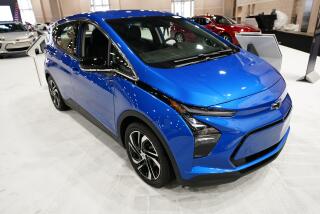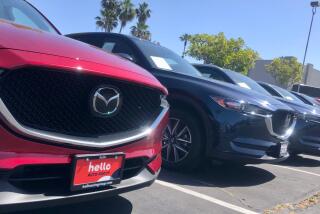Lexus, Porsche, Toyota, Lincoln top J.D. Power dependability list
- Share via
Lexus, Porsche, Toyota and Lincoln had the best records in the 2013 J.D Power and Associates vehicle dependability study.
In good news for car owners, the study found that overall, cars are becoming more reliable. Other top scorers included Buick, Mercedes-Benz, Honda and Acura.
Land Rover scored the worst, with owners of its vehicles reporting problems at more than three times the rate of Lexus. The Dodge brand was the second worst and Mitsubishi third worst. Other poor scorers included Jeep, Volkswagen and Jaguar.
The study measures the number of problems owners have experienced over the last 12 months in cars purchased during the 2010 model year.
Overall, the cars experienced an average of 126 problems per hundred vehicles. That was a decline from 132 the previous model year and the lowest average since J.D. Power launched the study in 1989.
“It is great news for consumers,” said Raffi Festekjian, J.D. Power’s director of automotive global research operations. “Manufacturers continue to keep their eye on the ball and improve quality.
“Consumers are spending less time at the dealer and there is less money spent on repairs if you have driven past the original warranty because the vehicles are more dependable.
PHOTOS: 10 worst cars ever sold in America
The study comes as consumers are keeping their cars longer.
On average, drivers are now holding onto the cars they have purchased new for nearly six years, a record length of ownership, according to automotive research firm R.L. Polk & Co. For consumers who purchased used vehicles, the average length of ownership is nearly 50 months.
Tepid consumer confidence has combined with increased durability of vehicles and more robust warranties to lengthen the time people are holding on to their car, according to Polk.
“Our data show that the dependability is better and that gives consumers confidence. If they are experiencing fewer problems they will hold on to the vehicles longer,” Festekjian said.
J.D. Power found that more than two-thirds of the brands had better scores from the previous years and the domestic nameplates improved at a slightly faster rate than the import brands.
Still, the import brands, led by the Japanese automakers, were still more dependable, logging 10 fewer problems per hundred vehicles. But the gap was smaller, shrinking from 13 problems per hundred vehicles in last year’s study.
In one finding, the study observed that the common assumption that newly redesigned or substantially changed model cars were less reliable from autos that were largely unchanged from the previous model year may be wrong.
Redesigned models experienced an average of 116 problems per hundred vehicles, well below the overall average and the average of 133 problems for models unchanged from the 2009 model year.
“There is a perception that all-new models, or models that undergo a major redesign, are more problematic than carryover models,” said David Sargent, vice president of global automotive at J.D. Power. “This is not the case. The rapid improvement in fundamental vehicle dependability each year is more than offsetting any initial glitches that all-new or redesigned models may have.”
The number of problems people experience with their cars has important implications for the auto industry. J.D. Power found that 54% of the owners who had no problems with their vehicles stay with the same brand when they purchase their next car. Brand loyalty slips to 41% when people experience three or more problems with their vehicles.
The top 10 car brands (from best to worst, with the average number of problems) were: Lexus, 71; Porsche, 94; Lincoln, 112; Toyota, 112; Mercedes-Benz, 115; Buick, 118; Honda, 119; Acura, 120; Ram, 122; and Suzuki, (which is exiting the U.S. market) 122. The remaining two brands that scored better than the industry average of 126 were Mazda at 124 and Chevrolet at 125.
The next 10 best auto brands, all below the industry average, were: Ford; 127; Cadillac, 128; Subaru, 132; BMW, 133; GMC, 134; Scion, 135; Nissan, 137; Infiniti, 138; Kia, 140; and Hyundai, 141.
The rest were: Audi, 147; Volvo, 149; Mini, 150; Chrysler, 153; Jaguar, 164; Volkswagen, 174; Jeep, 178; Mitsubishi, 178; Dodge, 190; and Land Rover, 220.
However the scores didn’t always correlate to individual models. Hyundai scored well below average in the study but its Sonata was the top mid-size car. Likewise, Scion scored below average but its xD was the top sub-compact car.
The highest ranked compact car was the Toyota Prius, and the top large car was the discontinued Buick Lucerne. The highest ranked entry premium car was the Lexus ES 350 while the highest ranked premium car was the Audi A6. The GMC Sierra was the top large pickup truck.
The study is based on survey responses from more than 37,000 owners of vehicles purchased during the 2010 model year. The research was done in the fourth quarter of 2012.
ALSO:
Alfa Romeo will launch new sport car in U.S.
Consumer Reports says owners rank Ford, Toyota Honda best
Follow me on Twitter (@LATimesJerry), Facebook and Google+.








